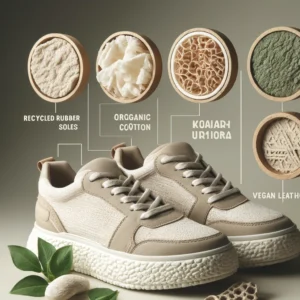Materials in Sustainable Sneakers: What Truly Makes Footwear Eco-Friendly?
“Sustainable sneakers blend style, comfort, and a commitment to the environment.”
The growing concern for the environment and sustainability has driven demand for eco-friendly products, including footwear. Sustainable sneakers not only help reduce carbon footprints but also promote more responsible manufacturing practices.
This article explores the various materials used in crafting sustainable sneakers, such as recycled rubber, organic cotton, and vegan leather. It also explains the environmental benefits of these materials and how they contribute to a more sustainable fashion industry.
Materials Used in Sustainable Sneakers
1. Recycled Rubber in Sustainable Sneakers
Recycled rubber is derived from discarded rubber products, such as old tires, which are processed and reused to create sneaker soles.
Benefits:
- Waste Reduction: Reduces the amount of rubber ending up in landfills.
- Lower Resource Consumption: Decreases the need to extract new natural resources.
- Durability: Offers resilience, extending the lifespan of sneakers.
Environmental Impact:
- Lower CO2 Emissions: Reusing materials reduces the energy needed for producing new rubber, thus lowering CO2 emissions.
- Natural Resource Conservation: Recycling helps preserve natural resources and avoids overexploitation of natural rubber.
2. Organic Cotton in Sustainable Sneakers
Organic cotton is grown without pesticides, herbicides, or chemical fertilizers and is harvested in a way that respects the environment and workers’ rights.
Benefits:
- Non-Toxic: Safer for farmers and ecosystems as it avoids harmful chemicals.
- Biodegradable: Decomposes naturally without polluting the soil.
- Comfort: Soft and breathable, enhancing sneaker comfort.
Environmental Impact:
- Water Conservation: Sustainable farming practices in organic cotton use less water.
- Soil Health: Crop rotation and compost usage improve soil health and biodiversity.
3. Vegan Leather in Sustainable Sneakers
Vegan leather, also known as synthetic or eco-leather, is made from materials such as polyurethane, microfiber, and treated natural fibers to mimic the look and feel of animal leather.
Benefits:
- Cruelty-Free: Does not involve animals, aligning with animal welfare principles.
- Versatility: Available in diverse textures and finishes, catering to various design needs.
- Durability: Many vegan leathers are robust and long-lasting, offering a high-quality sustainable alternative.
Environmental Impact:
- Reduced Water Usage: Producing vegan leather requires less water compared to traditional animal leather tanning.
- Lower Pollution: Modern vegan leather manufacturing aims to minimize toxic chemical use, reducing air and water contamination.
 Contributing to More Sustainable Fashion
Contributing to More Sustainable Fashion
“Every step counts: choose sustainable sneakers and make a difference.”
Reducing Carbon Footprint: Producing sustainable materials typically requires less energy and emits fewer greenhouse gases compared to conventional methods. This significantly reduces the carbon footprint of the footwear industry.
Circular Economy: The use of recycled materials, such as rubber and fabrics, supports a circular economy where products are reused and recycled instead of discarded. This not only minimizes waste but also promotes more efficient resource use.
Ethical Practices: Materials like organic cotton and vegan leather uphold more ethical farming and production practices. This includes fair working conditions, sustainable farming methods, and a reduced environmental impact.
Innovation and Technology: The pursuit of sustainable materials drives innovation in footwear design and manufacturing. This can lead to the creation of more durable, comfortable, and functional products, enhancing user experience while reducing environmental impact.
Adopting sustainable materials in sneaker manufacturing is a crucial step toward greener and more responsible fashion. Recycled rubber, organic cotton, and vegan leather are just a few examples of how the footwear industry is innovating to lower its environmental impact.
By choosing sneakers made with these materials, you are not only supporting more sustainable practices but also contributing to a healthier future for our planet.
Brands Leading the Change in Sustainable Sneakers
In the quest for sustainable sneakers, several brands have stood out for their commitment to the environment and innovation in eco-friendly footwear manufacturing.
These brands are not only transforming the footwear industry but also setting new standards for sustainability and social responsibility. Below is a list of pioneering brands in eco-friendly sneakers, highlighting their philosophy, manufacturing processes, and most popular products.

“Reduce your ecological footprint with every pair of sustainable sneakers you wear.” 1. Allbirds
Philosophy: Allbirds was founded with the mission of creating comfortable, sustainable footwear using natural and eco-friendly materials. The brand focuses on minimizing its environmental impact at every stage of production.
Manufacturing Processes:
- Natural Materials: Uses merino wool, sugarcane, and eucalyptus instead of synthetic materials.
- Responsible Production: Manufacturing is conducted in facilities that uphold high sustainability standards and fair labor conditions.
- Transparency: Allbirds publishes the carbon footprint of each product and continually works to reduce it.
Popular Products:
- Wool Runners: Made from merino wool, these shoes are soft, breathable, and naturally odor-resistant.
- Tree Dashers: Crafted with eucalyptus fibers, offering a lightweight and sustainable option for runners.
- Sugar Zeffers: Sandals made from sugarcane, an eco-friendly alternative to traditional EVA.
2. Veja
Philosophy: Veja focuses on transparency, social justice, and the use of eco-friendly materials. The brand works directly with farmers in Brazil to source natural rubber and organic cotton, ensuring fair trade practices.
Manufacturing Processes:
- Organic and Recycled Materials: Uses organic cotton, vegetable-tanned leather, and recycled plastic bottles.
- Ethical Production: Veja’s factories in Brazil comply with strict labor and sustainability standards.
- Transparency: Shares detailed information about its suppliers and production processes.
Popular Products:
- V-10: Sneakers made with vegetable-tanned leather and organic cotton, celebrated for their classic and sustainable style.
- Campo: Crafted with ChromeFree leather and wild rubber soles, combining elegance with eco-sustainability.
- Esplar: Designed with organic cotton and wild rubber, offering an ethical and modern choice for daily wear.
3. Adidas and Parley Line
Philosophy: In collaboration with Parley for the Oceans, Adidas has introduced a line of products made from plastic waste recovered from the ocean. This initiative not only reduces marine pollution but also promotes material reuse.
Manufacturing Processes:
- Recycled Plastics: Parley sneakers are crafted from recycled plastics collected from coastlines and oceans.
- Innovative Technology: Adidas uses advanced processing techniques to transform waste into high-quality materials.
- Continuous Commitment: The brand is dedicated to expanding its use of recycled materials and improving sustainability practices.
Popular Products:
- Ultraboost Parley: High-performance sneakers made with Parley Ocean Plastic™, offering exceptional comfort and support.
- NMD_R1 Parley: A blend of urban style and sustainability, using recycled plastics for a modern, eco-friendly option.
- Solarboost Parley: Designed for runners, these sneakers utilize recycled materials without compromising performance.
Benefits of Sustainable Sneakers: Beyond Fashion
Choosing eco-friendly sneakers is not just a style statement but also a commitment to sustainability and ethics. Opting for this type of footwear brings multiple benefits for consumers and the environment alike. Here’s how sustainable sneakers can make a significant difference.
Reducing Carbon Footprint with Sustainable Sneakers
- Use of Sustainable Materials: Eco-friendly sneakers are made with materials that have a lower environmental impact. Recycled rubber, organic cotton, and vegan leather require fewer natural resources and produce fewer carbon emissions compared to conventional alternatives. This contributes to reducing the carbon footprint of the footwear industry.
- Efficient Production Processes: Sustainable brands often employ more efficient and less polluting production methods. They use advanced technologies to minimize waste and optimize energy usage. By reducing resource consumption and greenhouse gas emissions, these practices help mitigate climate change.
- Circular Economy: Eco-friendly sneaker designs often incorporate principles of a circular economy, such as material reuse and product recycling at the end of their lifecycle. This not only reduces landfill waste but also cuts down the need for producing new materials, saving energy and resources.
Supporting Fair Labor Practices
Ethical Working Conditions: Many sustainable brands are committed to ensuring fair and safe working conditions for their employees. This includes fair wages, reasonable working hours, and safe workplaces. By choosing sneakers from these brands, consumers directly support ethical labor practices and improve workers’ quality of life.
Fair Trade: Fair trade is another cornerstone of many eco-friendly footwear brands. This approach ensures fair prices for producers and workers, respecting their rights and fostering stronger, sustainable communities.
Promoting Conscious Consumption
Consumer Education: Eco-friendly brands often strive to educate their consumers on the importance of sustainability. By providing transparent information about their practices and materials, these brands empower consumers to make more informed and responsible choices.
Durability and Quality: Sustainable sneakers are designed to last longer, reducing the need for frequent replacements. This approach is better for the environment and represents a better long-term investment for consumers. Superior durability and quality encourage more conscious and less impulsive consumption.
Design Innovation: Sustainability doesn’t compromise style. Many eco-friendly brands lead the way in design innovation, creating products that are both aesthetically pleasing and functional. This shows that it’s possible to enjoy fashionable products without sacrificing environmental and ethical values.
Environmental Benefits
Conservation of Natural Resources: Using recycled and organic materials helps conserve natural resources, avoiding overexploitation and promoting long-term sustainability.
Pollution Reduction: Sustainable production processes generate less air, water, and soil pollution, positively impacting local ecosystems and the planet’s overall health.
Biodiversity: Organic farming and responsible production practices support biodiversity, ensuring ecosystems maintain their natural balance and resilience.
For more insights, see Current Trends in Urban Sneakers for Kids.
“Sustainable sneakers are the future of footwear, blending innovation and respect for the environment.”
